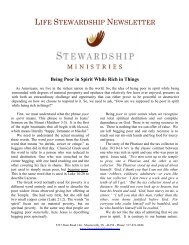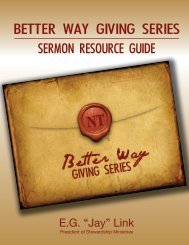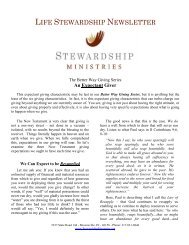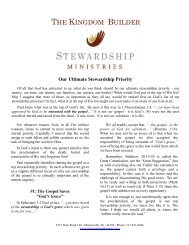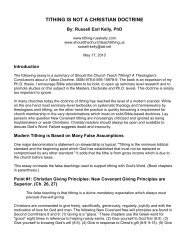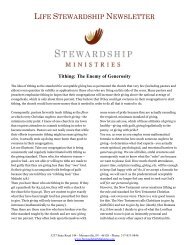âWill a Man Rob God?â (Malachi 3:8) - Biblical Foundations
âWill a Man Rob God?â (Malachi 3:8) - Biblical Foundations
âWill a Man Rob God?â (Malachi 3:8) - Biblical Foundations
Create successful ePaper yourself
Turn your PDF publications into a flip-book with our unique Google optimized e-Paper software.
16<br />
<strong>Malachi</strong> 3. <strong>Malachi</strong> 3:6–12 91 has been used and misused by many preachers. 92 As one<br />
commentator aptly notes, “The major purpose of the prophet’s message was to rekindle the fires<br />
of faith in the hearts and minds of a discouraged people.” 93 The fact that the Jews were<br />
withholding the tithes was an indication of a greater disobedience of the nation. The main<br />
purpose of this section is a call to repentance, which <strong>Malachi</strong> then applies to the specific problem<br />
of tithing. 94 In spite of people’s sins, <strong>God</strong> loved them and patiently waited for them to return. 95<br />
As Smith comments, “Yahweh waits to be gracious unto his people; but the exercise of his grace<br />
is conditioned upon a proper attitude of mind and heart on the part of the would-be recipients.” 96<br />
The passage begins with the Lord stating that he does not change. Apparently some had<br />
become weary of waiting and thought that <strong>God</strong> had changed his mind and become unfaithful;<br />
Yahweh categorically denies this. In fact, Yahweh is not the only one who does not change. The<br />
sons of Jacob, likewise, fail to change by failing to repent of their sins. 97<br />
The text begins with a shift in its addressees; the prophet is now addressing Israel, not<br />
just the priests. 98 Also, the question arises to which tithe <strong>Malachi</strong> is referring. Is he making<br />
reference to one specific tithe, or is he referring to all the tithes in the Pentateuch? Most likely,<br />
<strong>Malachi</strong> has in mind the law in Num 18:21, not Deut 14:22–29. 99 In Deut 14:22–27, the tithe was<br />
to be brought to Jerusalem, and the people were to celebrate with the priests. The people were<br />
partakers in the feast, and the tithe still belonged to the people. 100 In Mal 3, the tithe is to be<br />
brought into the “storehouse.”<br />
91 These verses are seen as a unit by Smith, Micah–<strong>Malachi</strong>, 331; Verhoef, Haggai and <strong>Malachi</strong>, 298; Greg Long,<br />
“Give Offerings to <strong>God</strong>: <strong>Malachi</strong> 3:6–18,” Theological Educator 36 (1987): 116. Contra Carl F. Keil and Franz<br />
Delitzsch, <strong>Biblical</strong> Commentary on the Old Testament (trans. James Martin; Edinburgh: T. & T. Clark, 1889), 2.462,<br />
who say the unit is Mal 3:7–12.<br />
92 For support for this statement, see Smith, “The Tithe,” 22.<br />
93 Long, “Give Offerings to <strong>God</strong>,” 116.<br />
94 Ibid., 117. Similarly, Bennett, “<strong>Malachi</strong>,” 389, says that the most important matter in this passage is that of<br />
disobedience.<br />
95 Raymond Calkins, The Modern Message of the Minor Prophets (New York: Harper, 1947), 135.<br />
96 John Merlin Powis Smith, A Critical and Exegetical Commentary on the Book of <strong>Malachi</strong> (ICC; Edinburgh: T. &<br />
T. Clark, 1912), 69.<br />
97 See Smith, Micah–<strong>Malachi</strong>, 331–32.<br />
98 Burton L. <strong>God</strong>dard, “<strong>Malachi</strong>,” in The <strong>Biblical</strong> Expositor: The Living Theme of the Great Book (vol. 2; ed. Carl F.<br />
H. Henry; Philadelphia: A. J. Holman, 1960), 385.<br />
99 See <strong>Rob</strong>ert C. Dentan, “The Book of <strong>Malachi</strong>,” in The Interpreter’s Bible (vol. 6; ed. George A. Buttrick; New<br />
York: Abingdon, 1956), 1140; Smith, <strong>Malachi</strong>, 71.<br />
100 See de Vaux, Ancient Israel, 1.214.



